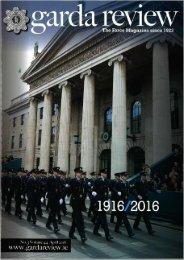Conference Report 2016
Table of contents contains links on page 5. It can be used to skip through chapters.
Table of contents contains links on page 5. It can be used to skip through chapters.
Create successful ePaper yourself
Turn your PDF publications into a flip-book with our unique Google optimized e-Paper software.
Section 1: Pay and Allowances<br />
degree than those made by prosecutors or judges.<br />
Gardaí frequently have to decide whether the<br />
system will be invoked in the first instance and the<br />
likely outcome. This paradox puts the criminal<br />
justice system standing on its head, as those with<br />
the greatest responsibility are subjected to the<br />
lowest pay and social status.<br />
3.28 The point was also made in the National Economic<br />
and Social Council’s (1984) assessment, when<br />
focusing upon the discretionary feature of the<br />
garda’s work. A practical and beneficial<br />
consequence is that a large proportion of those<br />
arrested by the gardaí are not prosecuted. This<br />
discretionary power is not just an integral part of the<br />
job; it is essential.<br />
3.29 The literal enforcement of the law would lead to<br />
massive workloads in the courts, and the intense<br />
enforcement of the plethora of regulations would<br />
give rise to considerable public hostility. The<br />
intelligent use of discretion serves to diffuse and<br />
disarm situations that would otherwise be<br />
threatening and in effect it contributes directly to<br />
the relatively high standing of An Garda Síochána<br />
within the community. As the National Institute of<br />
Justice at the American Department of Justice<br />
concluded (1997), the role of the police in a<br />
democratic society is best understood in the<br />
context that:<br />
“Of all governmental operations, the police function<br />
is the most intimate – the daily, varied encounters<br />
between police officers and individuals, ranging from<br />
routine to traumatic, represent the most visible and<br />
powerful interaction between the government and<br />
the public. If the police perform their role effectively,<br />
society benefits immeasurably; if the police perform<br />
their job poorly, the damage to police confidence and<br />
democratic principles can be irreparable.”<br />
Increased Demands and Responsibilities<br />
3.30 An Garda Síochána is a complex organisation. It<br />
encompasses an extensive range of functions,<br />
wherein individual gardaí can be assigned to a wide<br />
variety of roles. These span from out-of-hours social<br />
care to counterterrorism; and all that lies between.<br />
3.31 It is this reality that led the Garda Training<br />
Committee to conclude; “the Garda Síochána has<br />
become a very complex, highly specialised and<br />
centralised institution”.<br />
3.32 To compound the increased complexity and<br />
associated specialist diversity, An Garda Síochána<br />
is also grappling to cope with an accelerating rate of<br />
change in society; not always successfully.<br />
3.33 Ireland’s rapid transition from an agricultural to<br />
manufacturing to service-based economy brought<br />
all of the implications this revolution has had for<br />
urbanisation, legislation, technology, immigration<br />
and the character of criminal activity. Relatively<br />
recently Ireland has been subject to the array of<br />
problems that have long-characterised other<br />
western industrialised democracies.<br />
3.34 There is a higher crime rate than existed in a<br />
traditionally rural society, decreasing respect for<br />
law and authority and a general weakening of the<br />
social bonds and consensus that provided stability.<br />
Since its foundation in 1922, An Garda Síochána has<br />
policed with the consent of the public. The<br />
relevance of the principle of ‘policing by consent’,<br />
becomes most evident in its absence.<br />
3.35 The problem now facing gardaí is that, in the past,<br />
communal forces nurtured a shared set of values.<br />
However, these forces have declined in influence<br />
and no longer apply in the way that they did when<br />
the force was established. Public support for An<br />
Garda Síochána remains relatively high. The<br />
operational impact of change is that the Force must<br />
now rely more on professionalism, adaptability and<br />
the commitment of its members. The reality is that<br />
recent changes in our environment leave the gardaí<br />
grappling to respond appropriately to the:<br />
• threat posed by terrorism, organised and armed<br />
criminal activity and related illegal product trades<br />
• growth of tension and conflict within Irish society,<br />
accompanied by a readier recourse to a<br />
significantly higher level of physical violence<br />
• increased complexity in and professionalism and<br />
expertise required on the job, due to rising<br />
educational standards and technological<br />
advances<br />
• increased pluralism of society and cultural<br />
diversity<br />
• persistent long-term unemployment, giving rise to<br />
large disaffected communities<br />
• higher legal standards in a society whose<br />
awareness of the rights of the individual has<br />
become a priority<br />
• greater number of often complex enforceable<br />
laws<br />
38th Annual Delegate <strong>Conference</strong><br />
2




